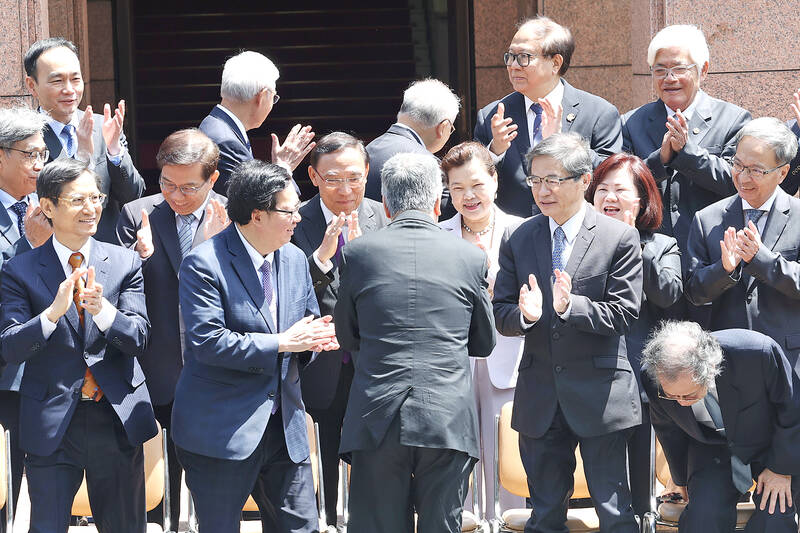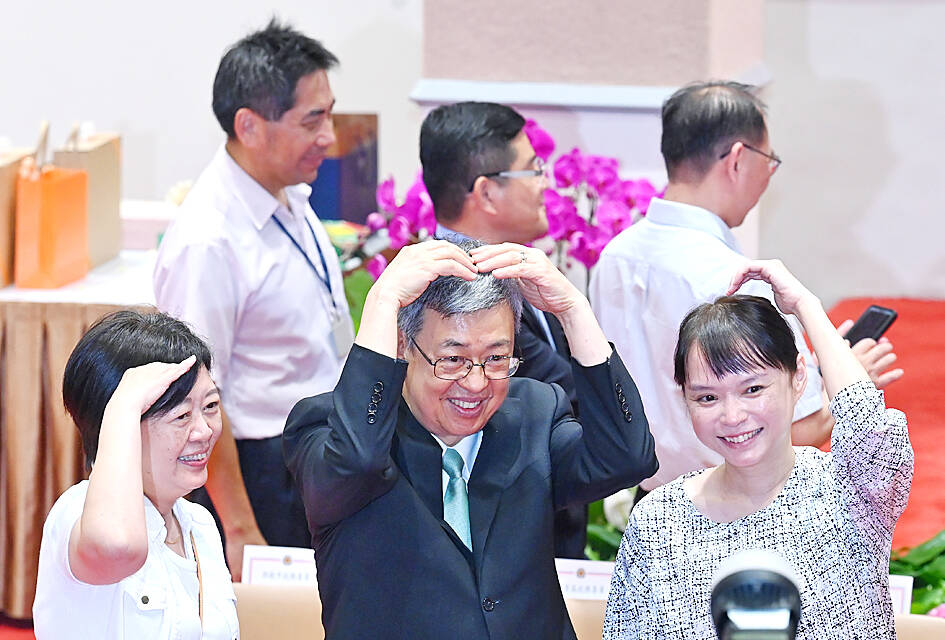Cabinet officials collectively resigned yesterday and are serving as caretakers before the country transitions to a new government, with president-elect William Lai (賴清德) to take office on Monday.
Premier Chen Chien-jen (陳建仁) presided over his last Cabinet meeting yesterday morning, in which the bill for the resignations was approved.
The bill requires the signature of President Tsai Ing-wen (蔡英文).

Photo: CNA
Government officials will continue serving as caretakers until Sunday, only performing routine and essential duties, and not approving any new policies.
Officials reviewed what they had accomplished in the past eight years under Tsai’s leadership, including average GDP growth of 3.15 percent and the transition to renewable energy sources.
Taiwan’s economic growth was better than Hong Kong, Singapore and South Korea — which along with Taiwan are known as the Four Asian Dragons — while renewable energy generation is up 110 percent compared with 2016, a report presented at the Cabinet meeting said.

Photo: Liu Hsin-de, Taipei Times
GDP grew NT$27 trillion (US$840.6 billion) during the period, the report said.
Continuous economic and exports growth was due to the government having clear industrial development strategies and offering incentives to draw foreign investment, it said.
The government in the past eight years increased the budget for childcare to NT$120.1 billion from NT$15.4 billion, while funding for long-term care rose to NT$87.6 billion from NT$4.95 billion, it said.
About 510,000 people have benefited from the increase in funding for long-term care, up from 90,000 in 2016, it said.
The minimum monthly wage has been adjusted in each of the past eight years to reach NT$27,470, up from NT$20,008, while the minimum hourly wage has been raised to NT$183 from NT$120, it said.
Salaries for government workers, teachers and military personnel are up 11.4 percent after three increases, the report said, adding that reform of the pension system for government workers, teachers and military personnel helped ensure the system’s sustainability.
The government’s pledge to make 200,000 social housing units available is to be achieved by the end of this year, while a NT$30 billion program was rolled out to subsidize rent and home loans to economically disadvantaged individuals and families, it said.
“Despite serious challenges brought by a rivalry between the US and China, water shortages, the COVID-19 pandemic, the Russian invasion of Ukraine, climate change, global inflation and energy price hikes, government officials and the public have worked together to build a warm and resilient country, and let the world see Taiwan,” Chen said.
Meanwhile, lawmakers agreed to invite premier-designate Cho Jung-tai (卓榮泰) to brief them on May 31 about the new Cabinet’s vision for governance, following negotiations between Democratic Progressive Party (DPP), Chinese Nationalist Party (KMT) and Taiwan People’s Party (TPP) lawmakers.
The legislative session is to be extended to July 16, they said.
The Act Governing the Legislative Yuan’s Power (立法院職權行使法) stipulates that the new premier should brief lawmakers within two weeks after taking office, adding that a written version of the briefing must be received by lawmakers three days in advance.
The KMT yesterday reiterated its determination to pass bills it proposed today in a plenary session by working with TPP legislators.
The bills would make “contempt of the legislature” a punishable offense and require the president to deliver a “state of the nation” address.
Some KMT and TPP lawmakers lined up outside the legislative hall on Wednesday to prevent DPP lawmakers from delaying the vote by inundating the sessions with motions.
DPP caucus secretary-general Rosalia Wu (吳思瑤) said that the actions were a spectacle and the agenda of the plenary session had been set by the Procedure Committee.
“All 51 DPP lawmakers are ready to do whatever we can and will not give up easily,” Wu said.

MAKING WAVES: China’s maritime militia could become a nontraditional threat in war, clogging up shipping lanes to prevent US or Japanese intervention, a report said About 1,900 Chinese ships flying flags of convenience and fishing vessels that participated in China’s military exercises around Taiwan last month and in January have been listed for monitoring, Coast Guard Administration (CGA) Deputy Director-General Hsieh Ching-chin (謝慶欽) said yesterday. Following amendments to the Commercial Port Act (商港法) and the Law of Ships (船舶法) last month, the CGA can designate possible berthing areas or deny ports of call for vessels suspected of loitering around areas where undersea cables can be accessed, Oceans Affairs Council Minister Kuan Bi-ling (管碧玲) said. The list of suspected ships, originally 300, had risen to about 1,900 as

Japan’s strategic alliance with the US would collapse if Tokyo were to turn away from a conflict in Taiwan, Japanese Prime Minister Sanae Takaichi said yesterday, but distanced herself from previous comments that suggested a possible military response in such an event. Takaichi expressed her latest views on a nationally broadcast TV program late on Monday, where an opposition party leader criticized her for igniting tensions with China with the earlier remarks. Ties between Japan and China have sunk to the worst level in years after Takaichi said in November that a hypothetical Chinese attack on Taiwan could bring about a Japanese

The WHO ignored early COVID-19 warnings from Taiwan, US Deputy Secretary of Health and Human Services Jim O’Neill said on Friday, as part of justification for Washington withdrawing from the global health body. US Secretary of State Marco Rubio on Thursday said that the US was pulling out of the UN agency, as it failed to fulfill its responsibilities during the COVID-19 pandemic. The WHO “ignored early COVID warnings from Taiwan in 2019 by pretending Taiwan did not exist, O’Neill wrote on X on Friday, Taiwan time. “It ignored rigorous science and promoted lockdowns.” The US will “continue international coordination on infectious

DEEP-STRIKE CAPABILITY: The scenario simulated a PLA drill that turned into an assault on Taiwan’s critical infrastructure, with the launchers providing fire support Taiwan yesterday conducted this year’s first military exercises at Longsiang Base in Taichung, demonstrating the newly acquired High Mobility Artillery Rocket System’s (HIMARS) ability to provide fire support and deep-strike capabilities. The scenario simulated an attack on Penghu County, with HIMARS trucks immediately rolling into designated launch areas and firing barrages at the Wangan (望安) and Cimei (七美) islands, simulating the provision of fire support against invading forces. The HIMARS are supposed to “fire and leave,” which would significantly increase personnel and equipment survivability, a military official said. The drill simulated an exercise launched by the Chinese People’s Liberation Army (PLA) Eastern